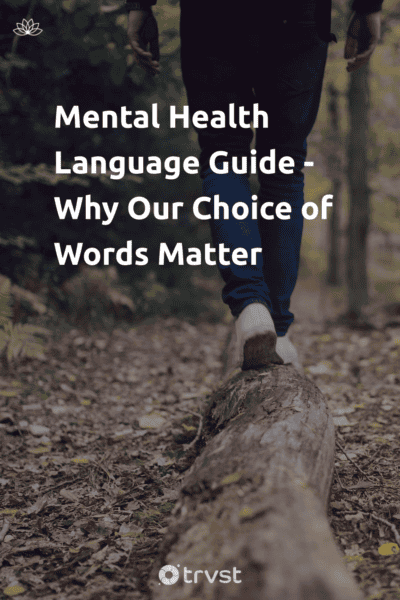Mental Health Language Guide - Why Our Choice of Words Matter
If a person has the flu, we don’t say they are “flued,” do we? So why do people say a person is schizophrenic when they have a mental illness called schizophrenia? Such a way of speaking has contributed immensely to the stigma associated with mental health problems. A mental health language guide is a valuable tool for society to improve its attitude toward dealing with mental health issues.
Words matter, and with this guide, you'll be able to hold stigma-free mental health conversations.
What makes words so powerful?

People respond to words without realizing it long before we open our mouths to reply. This is because the brain has a way of processing and connecting ideas, and words are the most powerful way of transmitting these ideas. One word can trigger an avalanche of memories and emotions.
Maria Richter and her associates observed in research that negative words had the power to release anxiety-related hormones2. In her book Seven And A Half Lessons About The Brain, Lisa F. Barrett explains that words can physically change a person's nervous system. That's because the parts of our brain that control language also control major body organs and systems.
Many more scientific studies show that words can have positive or negative impacts psychologically and physically. It can affect how we live, as we have seen people make life choices based on their feelings. We know that words cross geographical and chronological boundaries, bringing with them ideas, emotions, and perspectives.
Related: For important words from people working in mental health to stamp out stigma, and encouraging stories from those with lived experience, read our compilation of mental health quotes.
Why using the right mental health language matters
People with mental health conditions are sick or challenged like any other person with a physical illness. They deserve treatment, care, empathy, and respect, not stigma. However, even from the point of medical diagnosis, we can observe discrimination and stigmatization in the expressions used to describe mental illness.
Terms like “schizo,” “addict,” and “psycho” - with all their negative connotations - have been used even by professionals in the field, the media, in workplaces, and at home. But advancement in understanding mental health problems demands that we change how we talk about these issues and start appropriate conversations about mental health. The use of language is critical to the propagation of positive mental health culture.
Below are some reasons to consider.
It can increase or reduce the stigma
Recent research by a team from the National Institutes of Health addressed the issue of appropriate language in mental health. They discovered that mental health language could reinforce or reduce society's negative attitudes towards people who have mental illnesses or who are battling substance use1.
Language provides context for understanding issues, and discriminating words carry a stigma even in the most innocuous circumstances. Unfortunately, the language used to discuss mental health problems in the media, the hospital, and even in our communities have with them centuries of negativity and often ignorance. So now, even when we genuinely want to express empathy, we may use the same terms used to stigmatize.
It is great that language is dynamic and is changing to accommodate a newer and positive attitude toward mental illness.
It can deter or encourage help-seeking
A widespread consensus is that many people do not get the help they need because mental health services do not come cheap. But we’ve seen that even when those services are offered at no cost, many people still do not take them. Why? At least partly because of the language associated with a mental health diagnosis.
When people seek clinical treatment resources, the language spoken within the healthcare environment carries considerable weight. That's because we see clinical experts as the final authority in what is happening to a person’s psychology. So the labels they give stick more firmly, and so does any stigma that comes with those terms.
Destigmatized language can make an individual with mental illness more comfortable asking for help and following through with treatment plans. For example, when an individual struggling with self-harm is asked, ‘how are you feeling?’ rather than ‘what is wrong with you?’.
It can exacerbate mental health issues
If you scratch the surface of an open wound with a rock, it will bleed more than it should and may even get infected. That’s how poor word choices can make matters worse for someone with mental ill health.
When a person with a mental illness is made to feel like they are suffering because they have done something wrong, they are more likely to act out in anger at such an unfair idea. Then they might stop seeking help, risk their well-being even more and worsen their disorders.
Using expressions like “just snap out of it” or “if I were you…” when we discuss mental health concerns or treatment could be triggering even if the intentions behind them were good. But just like some words can become barriers to healing, others can speed up the process.
Language can shift focus on the person, or the illness
Poorly worded descriptions can reduce a person’s sense of identity to their illness. Focusing on the distinguishing characteristics of their mental health while describing a mental health condition removes the most crucial factor from the equation; the person.
Many people suffering from mental health problems have come to see themselves as lesser community members due to the labels that others have used on them. Instead of seeing themselves as unwell folks needing support and treatment resources, they see themselves as abnormal people with something wrong.
Appropriate language to use when talking about mental health

Some terms like “crazy,” “nuts,” and “loonie” are discriminatory, and we know not to use them. But they are some grey areas, where expressions that used to be okay are no longer acceptable because they contribute to stigma and discrimination.
Leaders from the National Institutes of Health have established that using appropriate language to discuss mental illness and addiction can help individuals who suffer from these disorders.
General dos and don’ts of mental health conversations
Don't overuse mental health terms
Overusing mental health diagnostic terms makes light of the experiences of people living with mental illnesses. For example, it may seem harmless or funny to say that not getting the last slice of pizza is depressing, but depression is a real mental health issue, not a throw-away line. Sometimes our harmless jokes do real damage.
Let’s refrain from using the term OCD as a synonym for being neat and organized or describing unpredictable weather as bipolar. It reduces the meaning of severe symptoms of mental illness, making it harder for people to speak freely about their diagnosis. Moreover, it is insensitive to them and their families.
Be thoughtful
When we talk about suicide, expressions like ‘committed suicide, but the word ‘committed’ originates from considering suicide as a sin or crime. It is more thoughtful to say that the individual died of suicide. Also, when an individual survives attempted suicide, the common expression used to describe this is ‘failed suicide attempt.’ This implies that we see them as a failure and that stigma adds to the emotional burden they already carry.
Prioritize the individual, not the illness
Using person-first language when discussing with or about people with mental health challenges is also essential. It keeps the discussion open-ended and non-discriminatory. So, just like you would say someone lives with diabetes, you should say an individual "lives with depression" and not that they are depressed. Instead of calling someone a recovering addict, say they are recovering from substance use disorder.
Listen sensitively
An essential part of the conversation is active listening. Many people have expressed how shocked they were to find out a cheerful and happy loved one died of suicide or had severe mental distress. When people talk about attempting suicide in passing, please take that as a cue to check in on them and encourage them to speak with you or a professional about their mental health status.
A cue in passing might be a person’s way of testing the waters to see if they are in a safe place to receive empathy and understanding.
For medical practitioners
The language of medical experts bears a lot of weight on how the patient views themselves and their chances and journey of recovery. It often stumps a person's recovery process with a mental health condition. The patient-centered recovery model is a better diagnosis and treatment of serious mental illness.
At the point of diagnosis, don't ask, “what is wrong with you?” which focuses on the illness and may make the patient feel like their humanity is being questioned. Instead, ask something like, ‘what happened or ‘what is happening to you?’. Avoid calling them a mental patient to help reduce stigma but rather someone in need of health care or simply a patient.
It is also essential to allow the individual to speak extensively about their lived experiences is also essential. They are an expert on themselves, which helps provide better insight into the illness as experienced by the individual. This is important because mental health is on a spectrum; one person may have symptoms that show up from time to time, while another may be chronic.
For friends and loved ones
The impact of a mental illness on a patient’s loved one is not dismissible. Families and friends have to provide a lot of support and care. Lots of folks readily seek to learn more about mental health conditions but may not consider the language system and, as such, risk doing more harm than good.
Talking about substance use, mental illness, or treatment programs can be complicated for many families. A person-first language would be helpful for families to remove barriers to understanding their members living with mental illnesses. It also allows them to provide support and fight stigma in the easiest way possible, with the power of words.
Talking about mental health
We have come a long way to treating mental health problems with the attention and thoughtfulness they warrant. But we are not quite there yet; there are still diverse views of the language details. For example, some refuse diagnostic labels or descriptions, while others find them helpful.
Also, some people prefer the term mental illness, while others believe mental ill health is better. The good thing is that language evolves, so better terms and descriptions could come up in the future.
No matter your technical preferences, the vital thing is that your words are thoughtful and free of stigma. Think about how what you say might affect individuals with mental illness, even in less formal situations, joking or conversing without knowing someone’s past.
Additionally, as many mental health facts show, you should understand that although mental illnesses cut across race, gender, and social background, they don't present in the same way in every individual. Further, newer and emerging conditions such as eco-anxiety are increasingly prevalent.
Consider the implications their background as Black, Indigenous, and People of Color (BIPOC) or L.G.B.T.Q.I.A.+ may have on their mental health. It gives you a more realistic and non-judgemental perspective. To best support those around you may also consider training as a mental health first aider or sharing your own mental health story to help others relate and recover.
Conclusion
Stigma and discrimination have permanently colored how we speak about mental health problems; it's time to change that. A fundamental part of treating a mental illness is talk, and without the correct language, healing would be more challenging than it should be.
But armed with the proper terminology, our communities, the media, psychologists, and those living with mental illness can reduce the stigma associated with mental health and substance use disorders.
| 1 | Volkow, N.D., Gordon, J.A. & Koob, G.F. Choosing appropriate language to reduce the stigma around mental illness and substance use disorders. Neuropsychopharmacol. 46, 2230–2232 (2021). https://doi.org/10.1038/s41386-021-01069-4 |
| 2 | Maria Richter, Judith Eck, Thomas Straube, Wolfgang H.R. Miltner, Thomas Weiss, |
Jen’s a passionate environmentalist and sustainability expert. With a science degree from Babcock University Jen loves applying her research skills to craft editorial that connects with our global changemaker and readership audiences centered around topics including zero waste, sustainability, climate change, and biodiversity.
Elsewhere Jen’s interests include the role that future technology and data have in helping us solve some of the planet’s biggest challenges.

